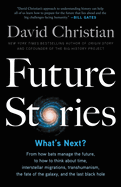
In Future Stories: What's Next?, David Christian, one of the founders of the field of Big History, applies the same expansive approach to a fascinating excursion into the future of humanity and the planet where we reside. For him, it's a logical extension of his pioneering course, which covers the existence of the universe from the instant of the Big Bang 13.8 billion years ago to the present. And in taking on the future, Christian (Origin Story), Professor Emeritus at Australia's Macquarie University, makes a persuasive argument for the "basic future-thinking principle that visions of possible futures must rest on knowledge of powerful trends in the past."
Christian organizes his book around four broad questions: 1. "What is the future?" 2. "How do living organisms cope with the future?" 3. "How do human beings try to glimpse, understand, and prepare for the future?" 4. "What sort of futures can we (plausibly) imagine for humanity, planet Earth, and the universe as a whole?" Within these headings, Christian engages with topics as diverse as Einstein's theory of relativity and a comparison of the way single-celled organisms like E. coli differ from human beings (with our some 30 trillion cells of 200 different types) in the way they adapt to the future's demands.
Christian's style is lively and inviting, and he takes pains to distinguish when he's proceeding from a solid evidentiary grounding and when he's indulging in more speculative musings. Future Stories is simultaneously entertaining and sobering, and is recommended reading for anyone who may be curious about what's ahead of us. --Harvey Freedenberg, freelance reviewer

